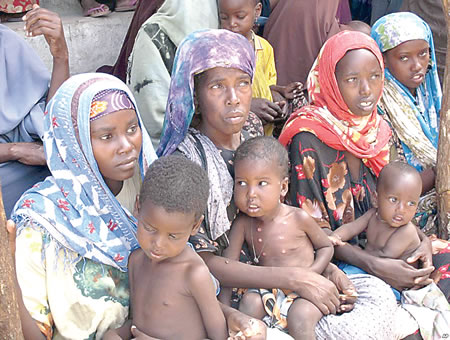
Coughs and colds can be miserable for children and for fatigued parents trying to get some sleep. So, it can be tempting to resort to over-the-counter (OTC) cold medicines to clear the congested nose or itchy throat.
But there is little evidence that these medications help relieve symptoms. In fact, experts in a review published online in BMJ said these medications should not be given to children younger than six years, and should be given with caution in those younger than 12 years.
ALSO READ: Atiku and his 2019 ambition
Ironically, most cold medicines come with labels promising relief for many of the symptoms that accompany the illness: congestion, runny nose, cough, thick mucus, aches and fever even in children.
Like any medication, they can cause side effects, some of which pose special risks to children. In addition, the use of these drugs has been associated with more serious events, such as convulsions, rapid heart rate, and death, in very young children.
These warnings are not new.Years back, the US Food and Drug Administration (FDA) issued a public health advisory that OTC cough and cold products should not be used to treat children younger than two years, although it did not issue any firm recommendations on that to date.
The commonest cause of a cough and the common cold in children is upper respiratory tract infection.
“Generally, when a child is coughing, we should address the basic problems and the treatment is supportive. And because it is a viral infection, there is no need for any cough expectorant or suppressant and so on,” said Professor Goke Falade, a consultant paediatric neurologist at the University College Hospital (UCH), Ibadan, Oyo State.
In instances that a cough is very disturbing or troublesome and the child cannot sleep, he added, “we advise that the mother can give simple home remedy consisting of palm oil with sugar or honey and weak tea. Lime can also be added to the weak tea or honey.”
Nonetheless, Professor Falade stated that children below the age of one year should not be given cough home remedies that contain honey due to the possibility of infantile botulism.
Botulism, although rare, occurs in about one in 10,000 children. And when it happens, it is always fatal. So, cough and cold home remedies that contain honey should only be given to children older than one year.
Also in children with stuffy or blocked noses, Professor Falade said breastfeeding should continue. It will help to build the body’s immunity against the viral infection.
When there is cold, the body’s immune system responds to fight the virus. One aspect of this battle is an increased production of mucus. At some point, there is so much mucus in the nasal passages that breathing becomes difficult.
Where breastfeeding is difficult because of a blocked nose, he suggested dropping a few drops of salt water or saline solution into the nostrils and then to clean it out. Babies and toddlers cannot blow their nose.
“Some people would have wanted to apply decongestants but there are problems with a decongestant. They are expensive and they should also not be used for more than three days. Meanwhile, children can have up to six to 12 episodes of the common cold in a year,” added Professor Falade.
The truth is that colds are more common during the school year. Some children will get a cold every month. So it’s no wonder that parents want to reach for a cold medicine.
No doubt, the use of mentholated balms or vapour rubs containing camphor, menthol and eucalyptus to relieve congested nose in adults is very common. Sometimes, the vapour rub is applied to the chests or used for steam inhalation. This, Professor Falade, said should not be used in children.
“The use of vapour inhalers is an anecdotal experience. When I have catarrh, I do not use any of those things and I get over this viral infection. I know that sometimes when the nose is blocked, it can be very inconvenient. So, in such a situation, you can put some saline water and then you wipe it off with a clean, soft material,” he said.
In instances where other bacterial infection might have set in, aside from a cough and cold, appropriate antibiotics might be recommended by the doctor.
“So we are trying to cut down on unnecessary use of antibiotics because the danger of superbug cannot be totally imagined. For ordinary viral infection, you do not need antibiotics, but when there is a superimposed infection, you will need antibiotic and such instances are very few,” he declared.
If a child has a cold, antibiotics would not help. Also, the more the child uses antibiotics, the more likely he or she is to get sick with an antibiotic-resistant infection in the future.
Dr Adeyinka Labaeka, a consultant paediatrician, UCH, Ibadan, also cautioned against the use of ointments or inhalers containing camphor, menthol and eucalyptus in children because it is detrimental in children with G6PD deficiency.
Menthol-containing substances in persons with G6PD deficiency break down their red blood cells, causing jaundice, including the passage of coke–coloured urine. In severe cases, it could resort to a shortage of blood, what is medically called anaemia, and kidney failure.
Currently, the recommendations on the use of OTC cough and cold medicines in children younger than six years vary depending on where the country.
Health Canada says not to use OTC cough and cold medicines in children younger than six years, and it’s the same in the United Kingdom.
In addition, although there have been deaths associated with the use of OTC cold medicines, these are always related to ingesting too high a dose.
Also, problems can occur when multiple medicines are given with overlapping ingredients by parents; more than one person gives medicine to the same child, adults try to sedate children with these drugs, or an adult-strength product is given to a child.
But research has repeatedly shown that cold medicines do not work for children younger than six, and they provide only a negligible benefit for children six to 12.
Expectorants are supposed to thin mucus and make it easier for you to expel from your body. According to a 2008 Cochrane review, research in adults showed mixed results on whether mucus thinners were effective, and there is no evidence so far to show that they work in children.
No one has proved that drinking lots of fluids loosens mucus or makes a cold resolve more quickly. But it is common sense that keeping a child hydrated will make him feel better.
WATCH TOP VIDEOS FROM NIGERIAN TRIBUNE TV
- Let’s Talk About SELF-AWARENESS
- Is Your Confidence Mistaken for Pride? Let’s talk about it
- Is Etiquette About Perfection…Or Just Not Being Rude?
- Top Psychologist Reveal 3 Signs You’re Struggling With Imposter Syndrome
- Do You Pick Up Work-Related Calls at Midnight or Never? Let’s Talk About Boundaries






